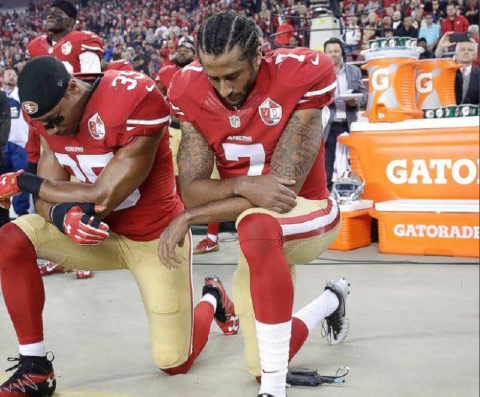Kaepernick’s protest sheds light on race issues
Quarterback kneeling for what he believes in.

MARCIO JOSE SANCHEZ, Associated Press
Quarterback Colin Kaepernick kneels with teammate Eric Reid before their Monday Night Football game against the Rams.
September 21, 2016
NFL quarterback Colin Kaepernick’s protest of the American national anthem was one of the summer’s biggest stories. Kaepernick, currently a member of the San Francisco 49ers, has been kneeling during the singing of the national anthem in every football game thus far as a protest of what he says are racist police practices and behaviors. Whether or not you as a reader agree with his tactics, Kaepernick’s status as a former starting quarterback has him in the perfect place to continue his protests of the racial issues currently facing the United States as a country.
As a history major, this writer knows all too well the racial issues that divided our country a million times over since its founding. American history is interwoven with examples of the racist practices made institutional by the belief that white people were superior to anyone who had a different skin color. It took Amendments to the United States Constitution, multiple presidents and widespread executive enforcement to remove many of the racist practices that had woven themselves into American life.
Even after the Civil Rights Movement, racial issues have not died away and with the development of the 24-hour news cycle, they have been thrust onto center stage time and again. Killings of unarmed black men by police officers, the riots in Ferguson, the Black Lives Matter movement, it’s all part of the new battle over racism in America.
Football players have not been shy about wading into racial matters in recent years either. Multiple then-St. Louis Rams players entered the playing field with their arms up in protest of the killing of Michael Brown in August 2014. Players have spoken out, making their opinions known and generally stayed respectful while making legitimate protests about the way people, especially black people, are being treated in the United States.
The outcry against the current situation has been widespread and varied, with former presidential candidate and Texas Senator Ted Cruz telling the players protesting police violence against African-Americans to stop disrespecting the flag, our nation and its heroes. Legendary 49ers wide receiver Jerry Rice told Kaepernick that he agreed with Kaepernick’s stance but that he was wrong to disrespect the American flag, and Republican presidential candidate Donald Trump said that Kaepernick should consider finding a different country.
There’s no certainty that Kaepernick will ever start another game in the National Football League after Blaine Gabbert won the quarterback competition between the two. His current stay in the spotlight is dependent on the interest of sports media and the focus on this protest could continue for the rest of the season or be concluded in just a matter of weeks. What should not be forgotten about Kaepernick’s protest is this: his ability to speak his mind has been protected by the millions of men and women who have put their lives on the line for this country so that our First Amendment could mean what it does. The very least we as a country could do is allow Kaepernick and those who join him to continue their protest in defense of that Amendment.





